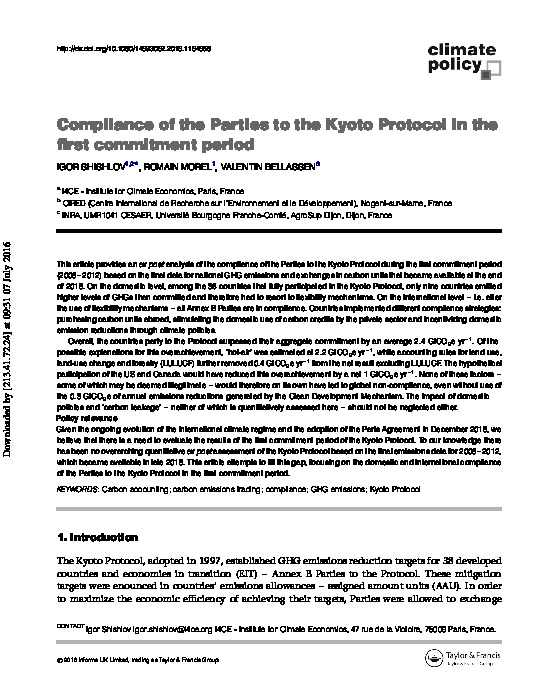I4CE published a peer reviewed article in Climate Policy on « Compliance of the Parties to the Kyoto Protocol in the first commitment period »
Authors: Igor Shishlov, Romain Morel, Valentin Bellassen
This article provides an ex post analysis of the compliance of the Parties to the Kyoto Protocol during the first commitment period (2008–2012) based on the final data for national GHG emissions and exchanges in carbon units that became available at the end of 2015. On the domestic level, among the 36 countries that fully participated in the Kyoto Protocol, only nine countries emitted higher levels of GHGs than committed and therefore had to resort to flexibility mechanisms. On the international level – i.e. after the use of flexibility mechanisms – all Annex B Parties are in compliance. Countries implemented different compliance strategies: purchasing carbon units abroad, stimulating the domestic use of carbon credits by the private sector and incentivizing domestic emission reductions through climate policies.
Overall, the countries party to the Protocol surpassed their aggregate commitment by an average 2.4 GtCO2e yr–1. Of the possible explanations for this overachievement, ‘hot-air’ was estimated at 2.2 GtCO2e yr–1, while accounting rules for land use, land-use change and forestry (LULUCF) further removed 0.4 GtCO2e yr–1 from the net result excluding LULUCF. The hypothetical participation of the US and Canada would have reduced this overachievement by a net 1 GtCO2e yr–1. None of these factors – some of which may be deemed illegitimate – would therefore on its own have led to global non-compliance, even without use of the 0.3 GtCO2e of annual emissions reductions generated by the Clean Development Mechanism. The impact of domestic policies and ‘carbon leakage’ – neither of which is quantitatively assessed here – should not be neglected either.
Read the article by clicking here
